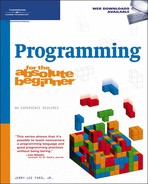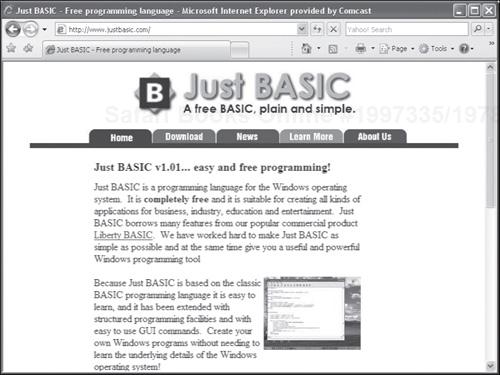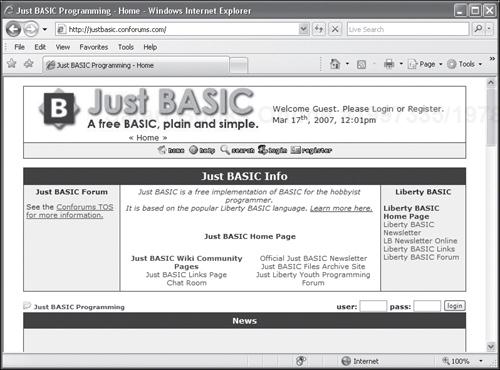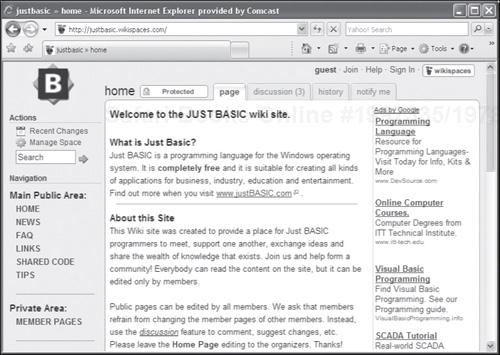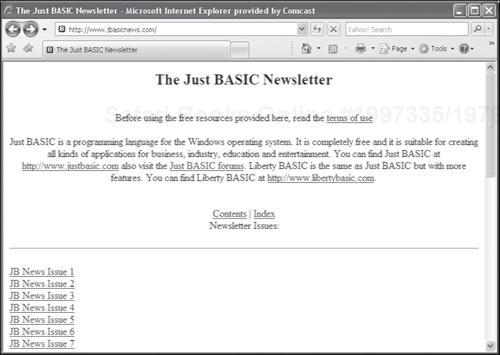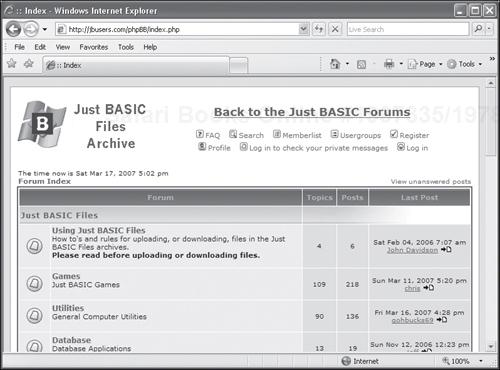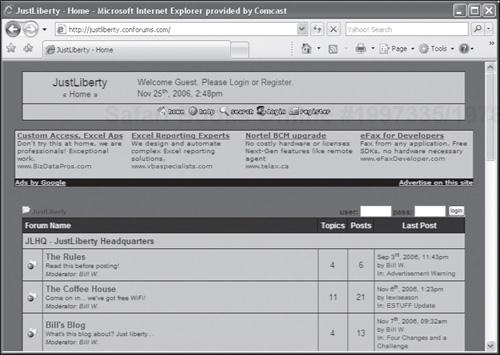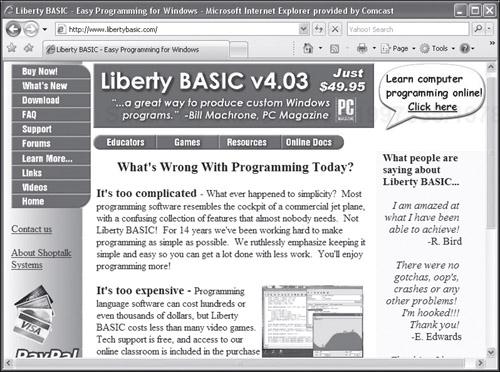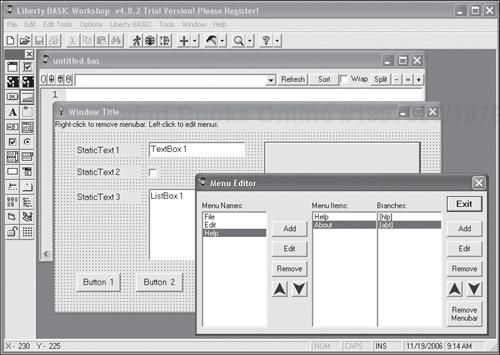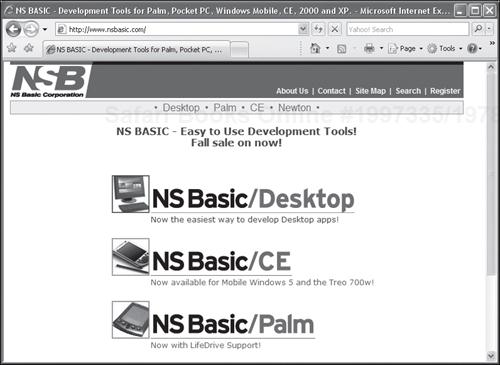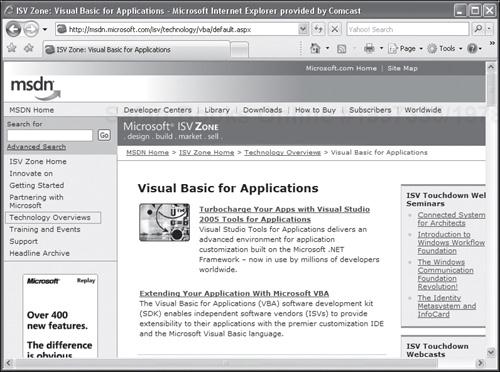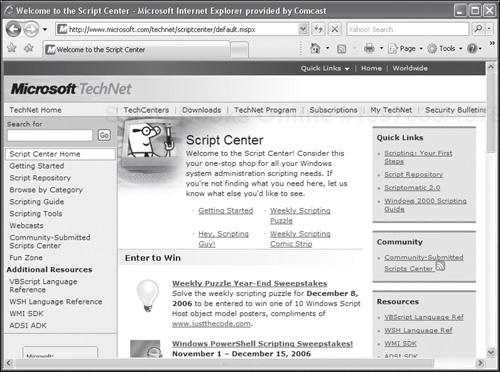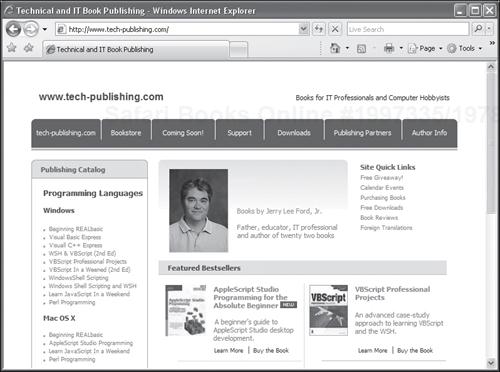Now that you have completed this book and have learned the fundamentals of programming, you may be wondering what to do next. Although you have learned much already, there is still plenty left to be learned. You should not view this book as the end of your programming education. Instead, think of it as the beginning. To become an effective programmer, you must continue to learn and expand your knowledge and skills.
Fortunately, there is no end to the number of different opportunities open to you. For starters, you may want to continue to work and experiment with Just BASIC to see how far it will take you. You may instead want to move on to any number of alternative and more advanced BASIC programming languages, such as Liberty BASIC, Visual Basic, or REALbasic. Alternatively, you might want to apply your BASIC programming skills to other avenues such as VBA (Visual Basic for Applications) or VBScript (A Visual Basic-like scripting language).
This appendix has been designed to help you keep your momentum going by pointingyou to different resources that you can tap into to learn more about BASIC programming in its many forms. You will learn where to go to learn more about Just BASIC, as well as find information about other programming languages and resources, including websites, mailing lists, forums, books, and more.
The Internet provides access to an abundance of information on Just BASIC. The first place to start is the Just BASIC website, which you will find at http://www.justbasic.com, as shown in Figure B.1.
You will find plenty of useful information at this website, including the latest news about Just BASIC, access to download the current release of Just BASIC, and upgrade information to Liberty BASIC, the big brother commercial version to Just BASIC.
Another excellent source for learning more about Just BASIC is the Just BASIC forum located at http://justbasic.conforums.com/ as demonstrated in Figure B.2.
At the Just BASIC forum you will be able to access different discussion forums and view thousands of topics and postings made by other Just BASIC programmers. You can also post your own questions and answers if you want. There are forums specifically dedicated to novice programmers, games and graphics development, tip sharing, and much more.
Another resource that you may want to investigate is http://justbasic.wikispaces.com, as shown in Figure B.3. As of the writing of this book, this resource was still relatively new. It was created to provide Just BASIC programmers with a place to congregate and share information and ideas. To participate, you must join. Joining is free.
Another good source for information on Just BASIC is provided at http://www.jbasicnews.com, as shown in Figure B.4.
Although it is not being published anymore, this website still provides free access to a collection of online newsletters dating back to July 2005. In addition to browsing through individual newsletters, the site lets you browse all of the topics covered using either a Contents or an Index view, making it easy to find specific topics.
Another excellent source of Just BASIC information can be found on the Just BASIC files archive located at http://jbusers.com/phpBB/index.php, as shown in Figure B.5. Here you will get access to forum discussions regarding a host of topics, including game development, utilities, database access, and Internet application development.
As of the writing of this book, this site had over 700 discussion postings with close to 300 registered members. If you run into a problem with a Just BASIC application that you cannot figure out on your own, you might want to join this site and post your question to see if other programmers have already run into the same problem and figured out a way to fix it.
Another forum that you should check out is the JustLiberty forum located at http://justliberty.conforums.com, as shown in Figure B.6. This forum provides you with another place to go to learn more about both Just BASIC and Liberty BASIC as well as to post questions and get help and feedback from fellow programmers.
As you have already been informed, Liberty BASIC is Just BASIC’s big brother. Liberty BASIC is marketed as a commercial implementation of the BASIC programming language. Though not as robust and powerful as other BASIC programming languages such as REALbasic and Visual Basic, Liberty BASIC is a low-cost option that is well suited as a programming language for computer hobbyists and individuals just getting started in BASIC programming.
To download a trial copy of Liberty BASIC, visit the Liberty BASIC website at http://www.libertybasic.com, as shown in Figure B.7. Here you can access online documentation, tutorials, and training videos. Registered users can even take an online Liberty BASIC programming class.
Because of its close relationship to Just BASIC, you will find that the transition from Just BASIC to Liberty BASIC is very straightforward. You will also find that Liberty BASIC provides all the capabilities provided by Just BASIC and much more.
Liberty BASIC benefits from the support of a large and active online community, which includes third-party developers that provide add-ons designed to extend or enhance Liberty BASIC’s capabilities. One area of third-party development that may interest you is applications that are designed to help simplify the development of graphical user interfaces for Liberty BASIC applications. Two such third-party applications are Liberty BASIC Workshop and Liberty BASIC Quick Visual Designer.
Liberty BASIC Workshop is an integrated development environment that is distributed as shareware, allowing to you download and try it before purchasing it. You can download a copy of it from http://alycesrestaurant.com/workshop.htm. Its features include a GUI builder that is designed to assist you in the development of Liberty BASIC window interfaces, as demonstrated in Figure B.8.
Liberty BASIC ToolBox is a graphical user interface forms designer whose purpose is to simplify and speed up the process of developing window interfaces for Liberty BASIC applications. Liberty BASIC ToolBox is distributed as freeware. It provides programmers with a Visual Basic-styled development environment, as demonstrated in Figure B.9.
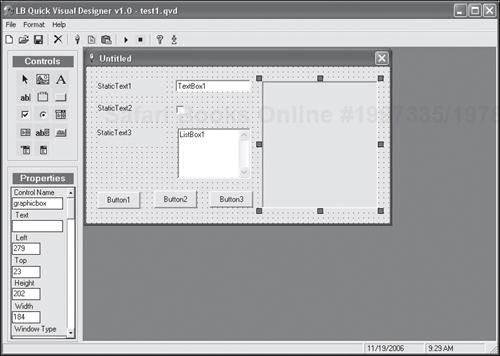
Figure B.9. Liberty BASIC Quick Visual Designer is a third-party GUI designer designed to speed up Liberty BASIC GUI development.
To download a free copy of Liberty BASIC ToolBox, visit http://jstmm.netfirms.com.
Professional programmers and software development companies that build software applications using BASIC require a full-featured commercial programming language. The most well known and commonly used BASIC programming language is Microsoft’s Visual Basic. Visual Basic facilitates the development software applications that run on Windows operating systems. However, for programmers that need to support application development on platforms other than Windows, REALbasic is the dominant BASIC programming language. Both of these languages are discussed more fully in the sections that follow.
REALbasic is a cross-platform software development language that allows programmers to develop software that can be run on Windows, Linux, and Mac OS X. It comes with its own built-in database, REAL SQL Database, thus facilitating the development of small database applications. It is well-suited to the development of business, game, and Internet applications. You can download a trial version of REALbasic at http://www.realbasic.com, shown in Figure B.10.
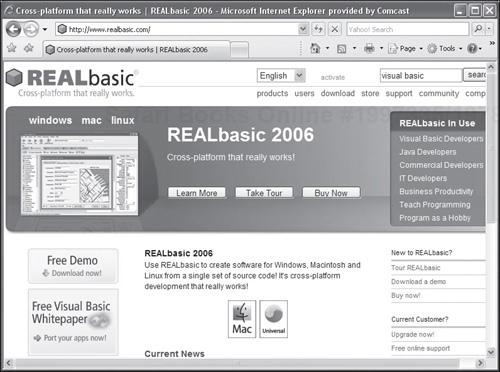
Figure B.10. REALbasic supports cross-platform application development on Windows, Linux, and Mac OS X.
REALbasic features a RAD integrated development environment, which significantly reduces the amount time and effort required to build graphical user interfaces.
For programmers whose customers are Microsoft Windows users, Microsoft Visual Basic is the dominant BASIC programming language. Visual Basic is a RAD application development tool that is closely integrated with the Microsoft .NET framework, upon which it depends in order to run and access system and network resources. As far as BASIC programming languages go, Visual Basic is as complicated as it gets. As a result, it takes longer to learn and master than other BASIC programming languages. To help address this issue, Microsoft has developed a scaled-down version of Visual Basic called Microsoft Visual Basic 2005 Express Edition, which is a little easier to learn.
You can download a free copy of Microsoft Visual Basic 2005 Express Edition at http://msdn.microsoft.com/vstudio/express/vb/, as shown in Figure B.11.
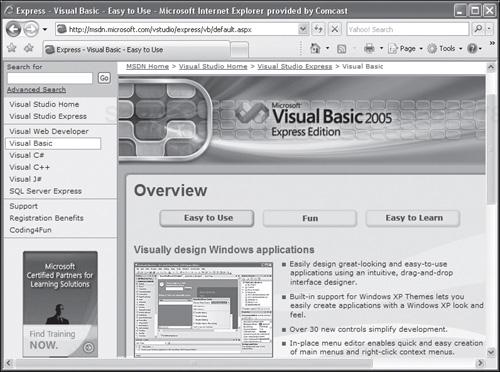
Figure B.11. Microsoft Visual Basic 2005 Express Edition is a free version of Visual Basic designed to attract beginner programmers.
Microsoft Visual Basic 2005 Express Edition is specifically designed to support Windows desktop development. Other versions of Visual Basic include support for the development of Internet applications as well as support for the development of applications for small appliances, such as PDAs and cell phones.
Another BASIC programming language that you might want to check out is NS BASIC. NS BASIC provides a full-feature IDE and it comes in a number of different versions that together support the development of applications for the Windows desktop and Windows CE as well as Palm and Newton hand-held devices. You can learn more about NS BASIC by visiting http://www.nsbasic.com, as shown in Figure B.12.
In addition to Just BASIC, Liberty BASIC, REALbasic, Visual Basic, and NS Basic, there are dozens of other programming languages that are based on BASIC. While it is well beyond the scope of this book to attempt to cover each of these BASIC dialects, I’d be remiss if I did not point out a few of these languages. Table B.1 provides a list of seven additional BASIC programming languages and provides the addresses of the languages’ websites. Also included in Table B.1 is a listing of the operating systems that each of these BASIC programming languages supports.
Of course, there is nothing that says you have to apply your newly developed programming skills to BASIC programming. The programming techniques and principles that you learned in this book can be broadly applied to any programming language, including such languages as:
Microsoft C#
Microsoft C++
Perl
Python
JavaScript
Java
Ruby
Each of these programming languages is separate and distinct and has its own set of strengths and weaknesses. To learn more about these and other programming languages, I suggest you spend a little time searching the Internet.
In addition to programming languages, there are a number of scripting languages based on BASIC. These scripting languages include Microsoft’s Visual Basic for Applications (or VBA) and VBScript, both of which are suited to perform different types of tasks, as discussed in the sections that follow.
Visual Basic for Applications is a scripting language that is integrated into some Windows applications, including Microsoft Word, Excel, PowerPoint, and Access. It provides users and programmers with the ability to automate certain aspects of the application in order to enhance it in some manner. This allows programmers to customize the application in order to solve a specific problem, thus providing an effective alternative to using a programming language such as REALbasic to create an equivalent custom application from scratch.
If, for example, you already have Microsoft Excel or Access installed on your computer, then you already have VBA installed and ready to use. To learn more about how to work with VBA, check out http://msdn.microsoft.com/isv/technology/vba/default.aspx, as shown in Figure B.13.
Another popular scripting language that is based on BASIC is Microsoft VBScript. VBScript runs in many different environments, facilitating the development of scripts that automate desktop, network, and browser-based tasks. You can learn more about VBScript and the environments that support it by visiting the Microsoft Script Center located at http://www.microsoft.com/technet/scriptcenter/default.mspx, as shown in Figure B.14.
Hint

Although VBScript is the most well known scripting language that is based on BASIC, there are plenty of other alternatives. Other scripting languages thatyou might want to look into include RBScript, which is a scripting language based on REALbasic (www.realbasic.com), and ScriptBasic (www.scriptbasic.com), which runs on Windows and Linux operating systems.
Depending on the path you choose to take as you move forward and advance your programming skills, many different challenges lie ahead of you. As such, it never hurts to have a good book at your side to help you along your way. This section provides you with a list of books covering different BASIC dialects that you may find helpful.
Microsoft Visual Basic 2005 Express Edition Programming for the Absolute Beginner
by Jerry Lee Ford, Jr.
This book provides a beginner-level introduction to Windows application development using Microsoft Visual Basic 2005 Express.
Beginning REALbasic: From Novice to Professional
by Jerry Lee Ford, Jr.
This book provides instruction on cross-platform application development on Windows, Linux, and Mac OS X using REALbasic.
Microsoft WSH and VBScript Programming for the Absolute Beginner
by Jerry Lee Ford, Jr.
This book provides a beginner-level introduction to Windows scripting using Microsoft VBScript and the Windows Scripting Host.
Microsoft Access VBA Programming for the Absolute Beginner
By Michael Vine
This book provides a gentle introduction to scripting Windows Access Database applications using Microsoft VBA.
Microsoft Excel VBA Programming for the Absolute Beginner
By Duane Birbaum
This book provides individuals who need to extend or customize Microsoft Excel’s capabilities with a beginner-level introduction to scripting Windows Excel using Microsoft VBA.
DarkBASIC Pro Game Programming, Second Edition
By Jonathan Harbour and Joshua Smith
This book provides individuals interested in taking a serious look at Windows game development with a beginner-level introduction to DarkBASIC game programming.
Last but not least, you may also want to check out my website, which is located at www.tech-publishing.com, as shown in Figure B.15.
In addition to learning about my books, you will find information about Just BASIC and other BASIC programming languages.
